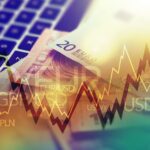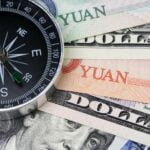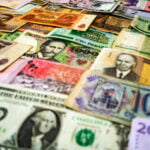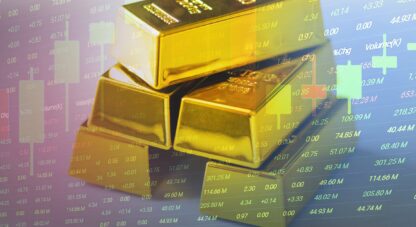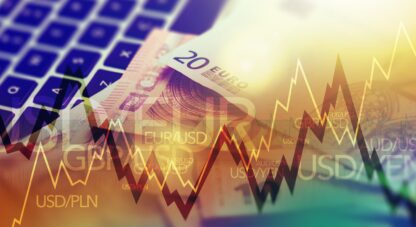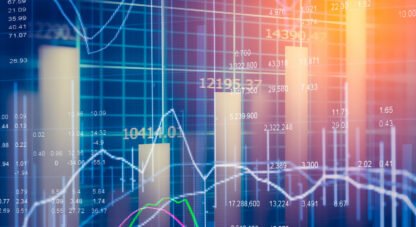Podcast: Play in new window
- NVIDIA Soars To 30x Sales
- Erdogan “Wins” The Turkey Again!
- Chances of FED Interest Increase In June Jump 60%
Artificial Stock Prices For Artificial Intelligence?
May 31, 2023
“Now, you have resurrected enthusiasm that relates to AI. Is it important? Yes. Over the next decade, does it put at risk 300 million jobs or more? Yes. Do I care about that because I’ve got kids who will be entering the workforce in a period of time where they may have fewer and fewer options? Am I concerned, and do I want to understand AI? Yes. But does Nvidia deserve to command a price that makes it six to seven times the size of Intel on half of Intel’s revenue?” —David McAlvany
Kevin: Welcome to the McAlvany Weekly Commentary. I’m Kevin Orrick, along with David McAlvany.
Wow, AI, artificial intelligence, a great idea. Maybe it’s not a human idea. Maybe ultimately, it will be the intelligence’s idea, but the stock prices are just exploding. And Dave, it reminded me, I have a client who started working with in the late ’90s, a tech guy, and he had about $100,000 when he called me. We did the triangle, and I said, “Why don’t you put a third in gold and then you can do what you do with your paper on the other two thirds?” And he did. He put about $30,000 in gold. Well, he started investing in Palm. Remember Palm? And it skyrocketed in price. And he kept leveraging. He would take loans out and continue to pour money in. It was worth over a million dollars very quickly. And he kept calling me saying, “You know what? I need to take that $30,000 and put it into Palm.” And I was like, “Mark, let’s don’t do that. Let’s keep that gold. It’s your foundation. Maybe you should add to your gold at this point.” And he just laughed. He said, “No, Palm’s going to the moon. This is the greatest idea.” Well, you and I know what happened in the year 2000, all of that disappeared. Now the idea for Palm was great, but—
David: Just because you’re the first to market doesn’t mean that you are going to be the company that maintains or grows market share. The idea was impeccable. And then from Palm came Blackberry, and from Blackberry came the iPhone. And so we have this smart device, which is a mobile computer that you can hold in, just like they said, in the palm of your hand. And yet it’s gone the way of the dodo bird.
Kevin: So you have to separate the technology from the company sometimes because that company may not be the one that actually takes it across the finish line. Mark called me back, and I’m not going to use his last name, but he called me back and he had lost everything in Palm except the 30,000 bucks. And he called me and he said, “Kevin, I’ve got an opportunity to buy Palm cheap, really, really cheap.” And I said, “Well, what do you have to work with?” He goes, “Well, I’ve got that gold. How about I sell that $30,000 worth of gold back to you?” And I talked him out of it. Fortunately, the gold’s up around six-fold from that time, but his gold stocks— Yeah, but that was all he had at the time.
David: Well, these are the early days for AI, and I think it’s particularly intriguing to see how it is used. Over the weekend, Memorial Day, and sitting around eating bratwurst with friends, and one person says, “I’ve used AI to write a grant proposal.” And we went around the table, and it’s something that is very usable. What we don’t know is what rights will be retained? What limitations will be applied? In what ways it will change with a little bit of time. This is the Wild West, and it will be tamed to some degree. It makes it particularly intriguing in terms of its use and application today. But the iterations are very unclear. What will exist and what will survive? Will we have multiple versions just like we had Palm, Blackberry, and then ultimately the iPhone?
Kevin: Well, and you were talking about sitting outside and talking. The unexpected happens, and this can happen in the stock market. This happens in the economy. It happens with geopolitics. But when your patio door is open, the unexpected happens, doesn’t it?
David: Yeah, I’m reading for the Commentary, and a little sparrow flies into the house, and then he is moving all over the place, and manages to knock himself out running into the glass on an attempted exit. And he was ready for flight within a few minutes, but today I want to talk about Turkey and other small birds. Canaries are important to the coal miner, but they’re also important to us.
Kevin: So if the canary is important to the coal miner, Turkey is important to the world economy?
David: Yeah, I mean the big bird or just the country. Doug’s summary of market dynamics is always valuable, but it was particularly concise and articulate this weekend. The NASDAQ 100 is up almost 31% this year. The mania in AI and big tech has not only fueled huge gains in company market capitalization, but also powered significant moves in popular indices, including the NDX, SOX, which is the semiconductors, and even the S&P 500. This bubble dynamic is a powerful creator of marketplace liquidity. It also incites fear of missing out. Between short covering and cajoling the under-invested, this speculation- and derivatives-induced rally is pulling funds into the marketplace.
The upshot is a further loosening of market financial conditions, irrespective of Fed tightening measures. And then this little piece there in the Credit Bubble Bulletin, I think is the canary. “The bond market is turning nervous. Loose financial conditions have worked to bolster both the economy and pricing pressures. More data this week (PCE, GDP Price Index, Services PMI, personal income spending, jobless claims) all point to resilient demand and inflation. And now market conditions are only loosening further.” Doug’s comment on the bond market turning nervous is key, and it’s echoed by Robert Prechter, who in the Elliott Wave Theorist says that you remember bonds and stocks bottomed together in October of 2022. If bonds are rolling over, stocks aren’t far behind.
Kevin: And when Robert Prechter is right, he’s right. I remember in 1987, that was my first year here, and you had Reagan in office, you had the Soviet Union crumbling. It was just blue skies for everybody, but the stock market was hitting all time highs. And I remember Robert Prechter because the Wall Street Journal did an article after the huge crash in October, and they said, “Who is this guy?” He called a major crash in October. Your dad talked about that, too, but virtually no one else was talking about it. With what’s going on right now in the market, Prechter’s nervous.
David: Yeah. And a part of it is because you see this divergence in behavior. As Nvidia drags the NASDAQ 100 and the S&P 500 higher, with just a few other names helping along the way, you do see a loosening of financial conditions within the stock market, within the derivatives market, and that increases the likelihood of a Fed hike in June.
Ironic, isn’t it? One more justification for being wary of further accommodation, or wary of rate cuts, which just a month or so ago were supposed to be eminent. And as the dollar strengthens, we have the yen, euro, and RMB weakening on the other side of the equation—RMB now at a six-month low. As the dollar strengthens, it creates stress in other parts of the world. And certainly we’re seeing that stress show up in certain segments of the Chinese economy. The developer sector is back on the brink. Country Garden yields started the month at 35%, a reasonably high yield, and just last week were as high as 61%.
Kevin: And you talk about breadth on the market. I’m going to use an analogy from this weekend. Dave, you’ve ridden this race. It’s called the Iron Horse here in Durango. And several thousand people start the race. 50, what is it? 52 miles from Durango to Silverton. The elevation gain actually is about 5,700 feet when you put it all together. Several thousand people start. That would be considered the breadth.
David: They start in one pack.
Kevin: Oh yeah, you’re looking at it and you’re like, “Wow.”
David: Huge Peloton.
Kevin: “Look at that. There’s 2000 people who are going to make it to Silverton,” but not in two hours. There’s only a couple of people who make it in two hours, and then there’s a bunch more that make it in four, and then there are some that make it in six. But the market’s like that. When we look at the S&P 500, if we were to judge as if the Peloton were just starting, we’d go, “Look at all of them. They’re moving really fast.” But by the time you get to the end of the race—
David: You get to see where the real strength is. And in this case, the real strength is just in a few names, and it’s because of where the capital is flowing. So hopefully our discussions of Dow Theory non-confirmation and weak breadth across the broader indices, and even within one like the S&P as we’ve talked about in previous weeks—the equal versus cap weighting—if you look at them from those two different vantage points, hopefully these conversation points will help bring insight into the current market dynamic. This type of market dynamic was last seen in March of 2000, with the NASDAQ defying gravity just prior to its 78% decline. So a little bit more on Nvidia in a bit.
Kevin: Well, and the 78% decline in the NASDAQ, I don’t think they broke even for another 15 years. If I remember right, wasn’t it 2015 that the NASDAQ actually got back to where it had lost from back in 2000?
David: NASDAQ took well over a decade to regain those losses.
Kevin: Okay. So let’s go back to the canary in the coal mine because you intrigued me when you said the Turkey in the coal mine, except for this one may be on a world currency, world debt kind of scale.
David: Maybe it’s a terrible play on words, but we have the extinct dodo bird, we have the canary, which the bond market certainly would suggest that something is coming for the stock market, and Turkey is just the third bird. In the past, we’ve looked at Turkey from multiple vantage points. One, they are a contender to be a new caliphate and are competing for that designation with Iran. The second thing that we’ve often talked about is Turkey’s diversified economy. It’s more diversified than most countries within the Muslim world, and it provides less boom and bust dynamics reflective of the price of oil. So when things are going poorly there, it really does speak to the management —
Kevin: But they have a lot of debt and it’s not in their own currency.
David: Yeah. So that’s the third thing that in conversations with Russell Napier on the program, we’ve talked about how, financially, Turkey is vulnerable given a high percentage of debt denominated in foreign currencies. And then another element of the Turkey conversation has been the country has been a key point of contention in Europe, a key point of reasoning why Turkey could never become a part of the EU. With migrants flooding from Turkey into Germany, you’ve seen sort of the reaction, the xenophobia if you will, but just the unsustainable quantities of people coming in to be a part of the EU project in Germany in particular. And then here in the last few days, we finished a runoff election because Erdogan didn’t have the majority needed for the earlier victory.
Kevin: Isn’t it interesting though? We still have Erdogan back for the next five years, right?
David: Yup.
Kevin: So that’s how those countries run. You don’t necessarily have to win the majority.
David: Back for another five-year term in the runoff election. From one perspective, he has been a success, if you look at his 20 years in office. It’s a little bit like looking at stimi checks. How popular are you if you’ve just finished a round of checks in the mail? Increasing popularity has a lot to do with what has been redistribution of wealth. It’s had a positive impact, politically. Politically.
Kevin: Everybody gets money. Everybody gets money.
David: But he has not lifted the hopes of the Turkish people, nor has he put them in a better economic position after 20 years of quasi-authoritarian rule. If you’re counting the lira, which is now down 90% since he took office, you’ve got a broad-based measure of impoverishment, right? The cost of everything is multiple times higher. It comes as no surprise that demand for gold in Turkey has been very high.
And again, this is kind of the catch 22. On the one hand, you like the stimi check. On the other hand, you realize that the cost of things is going up, and you might need some of that stupidity insurance. He’s still reelected. So what did we just see? Was it the Napoleon moment? I care not who cast the votes of a nation provided I can count them. Or is it the population under the delusion that the fiscal policies used to buy their votes are somehow disconnected from the lira’s plight and continued plunge? The risk of debt crisis in Turkey remains higher than almost any other country today, given the scale of the debts they have financed in foreign currencies. And so the erosion of foreign exchange value has meant that the burden of cross-border debt has in essence grown exponentially.
Kevin: Okay, so let’s explain this a little bit, because cross border debt, if I borrow in dollars as a country and I can print dollars, it’s no big deal. That’s Modern Monetary Theory. If I can do that to the—
David: You control your currency in the debt that it’s denominated in.
Kevin: Let’s say I borrowed from my house instead of in dollars, a currency that went dramatically up relative to the dollar. Now, I’m still paying it back in dollars. But if I borrowed in any other currency that dramatically increased against the dollar, I’ve got to pay back that increase. You said that the Turkish lira has lost 90% of its buying power.
David: Yeah. Now, something similar happened in Iceland where you had borrowing in very cheap percentage terms. And so you had folks in Iceland financing their mortgages in Swiss francs. And the Swiss franc you could borrow at close to 0%.
Kevin: Great interest rate.
David: Right. But you’re having to pay back in Swiss franc. So if the Swiss Franc appreciates and the Icelandic króna depreciates, now it’s as if your payment is higher by 20% or 30% or 50% or 150%. And all of a sudden you see defaults on loans, and it’s no surprise that the Icelandic banking sector imploded because they were facilitating cross border loans between Iceland and Switzerland.
Kevin: And that’s happening in Turkey. I mean, if you ran a company in Turkey at this point—
David: Right. It’s both at the commercial and at the governmental level. Companies in Turkey have carried foreign denominated debts in excess of $335 billion. That’s in recent years. And the government, add to that another 100, 110 billion. They run a significant trade and current account deficit, like the US does. But whereas the US can raise debt in US dollar terms, the Turkish government is not so fortunate. So whether it’s the government or Turkish corporations, they are raising money, but they’re having to do it in another currency.
And again, this is very different than the US Treasury debt. If we’re running current account deficits, raising money in US dollar terms in the US Treasury debt market, just no big deal. And it’s a totally different risk profile. But running a current account deficit requires financing. And in the past, you look at how we’ve done that. We’ve got this interesting trade relationship with China, with the Japanese. Previously, it was the Middle Eastern countries where we basically recycle. We’re importing more than we’re exporting.
Kevin: And when you bring in more than you export, you have to have something to subsidize that.
David: We’ve got a deficit. They’ve got a surplus, a surplus of dollars. What do they do with those dollars? They reinvest them in US Treasurys. And it keeps this non-virtuous cycle going.
Kevin: Until it stops. Yeah, until it stops.
David: And that’s the nature of the trade deficit, importing more than we export. It means that the US consumer must be subsidized.
Kevin: So we haven’t really felt any pressure running a foreign account deficit?
David: No. That’s one of the things that Jacques Rueff years ago described as the deficit without tears. We are amongst the only countries that can do that because we have the world’s reserve currency. The trade deficit, what we’re talking about here is one component in the current account. The current account is this broader basket which shows all of the funds coming out of or into a given country. So you’ve got services, you’ve got transfers, you’ve got subsidies, and many other flows again, out of or into a country. So the trade deficit is just one part of the “current account deficit.” It’s a subsegment, but it’s a big one.
April’s trade deficit in goods went to a six-month high, 96.8 billion. That’s, again, more imports into the US than exports from the US. That’s up from March’s number of 82.7 billion. To date, we have eager buyers of our Treasurys. And I think it’s just worth keeping in mind, if that eagerness, if the appetite for US Treasurys were to change, then you’ve got US bond market conniptions. And again, it’s fascinating to see what’s going on here because we do have a repricing in the US bond market as we speak. We have the prices of US bonds coming down, we have rates coming back up, and it’ll be very interesting to see if that trend continues irrespective of the Fed’s increasing or decreasing interest rates, the short end of the yield curve. The long end of the curve is saying maybe we’ve got a small version of US bond market conniptions developing as we speak.
Kevin: And again, we have to stress, the United States can handle those types of things to a degree. They can create inflation. Turkey, when they run a trade deficit, they cannot finance that in lira. They can’t just turn the press on.
David: Oh, that’s right. So Turkey runs the trade deficit, can’t finance it. And again, this is pretty straightforward. Who would want to be repaid with a rapidly devaluing currency?
Kevin: Sure, you want some Turkish lira?
David: Right. It’s a different version of Turkish delight. Turkish non-delight. It would be too easy to inflate away the value of the obligation. So foreign lenders prefer the insulation of debt instruments in euros, pounds sterling, or dollars, and this can create a tremendous amount of pressure on the currency, right? In this case, the lira.
Kevin: Well, and don’t central banks in the various countries keep reserves so that they can actually support their currency when they have situations like this?
David: That’s exactly right. So if the lira comes under pressure, they can try to fight the investor penchant for selling lira or selling short the lira. And in fact, Erdogan has gone so far as to say, “Well, I’ll throw you in jail if you short the lira.” I mean, you can’t do it in Turkey without taking your life into your own hands.
Kevin: But if you have reserves, you can at least stabilize the market to a degree.
David: That’s right. And this is the same kind of dynamic we had in 1997 and 1998 in Asia, just before the Asian financial collapse. The countdown in time was tied to the disappearance of the last bit of liquidity in foreign currency reserves. Again, you’ve got this reserve asset, and you can use it to prop up the value of your currency, but you can only do that as long as you’ve got reserves. If you spend through your reserves, then, again, it’s a little bit like watching the clock attached to an explosive device. It counts down to detonation.
First came the dwindling currency reserves, 1997, ’98, then came the currency collapse. The Thai baht was the first currency to go, and then it spread from there. Then you’ve got massive capital flight. There’s hot money coming into the region thinking that it was a good idea to invest, turns into hot money leaving.
Actually, this hot money dynamic is what we see with Nvidia today. You can’t stop it from flowing in. I’ll tell you, it’s going to be very upsetting, and you may even see the bankruptcy of a company. People couldn’t even imagine bankruptcy of Nvidia, not when it’s flying high at a trillion dollar market cap, but in the context of a recession and a market selloff and the reversal of these funds coming in instead of hitting the exits, you would be amazed at what hot money can do on the way out.
Kevin: But you can buy insurance for that type of thing. Okay, let’s go back to Turkey for a second. If it looks like Turkey’s going to default, you might have insurance on that. Hardly an episode passes, Dave, where you don’t bring up credit default swap prices, because they are a way of seeing danger. What’s the CDS on Turkey right now?
David: Yeah, you talk about interrelationships, and this is why things matter because back in the Asian financial crisis it started with the Thai baht and it was followed by 12 or 13 other countries throughout Asia directly impacted by the change in liquidity dynamics and currency devaluation. We’re talking about relationships, or in the financial world what they would call counterparties. And so for every loan that has been made to Turkey, someone looks at that and says, “There is a risk that I won’t get paid back. We were smart enough to denominate it in the right currency so we can’t get screwed on the basis of a devalued currency paying us back with cheaper and cheaper script, but they still may just not make payments at all. So how do we insure against default?”
Kevin: Right. It reminds me of travel during the days of Covid. You would definitely buy travel insurance. It cost you more.
David: Well, what if you have to cancel the trip?
Kevin: Exactly.
David: Are you just out the money? So CDS pricing, again, it’s the cost to insure against a Turkish default, credit default swap has doubled from the January levels of 10% to 21.4%. Just to illustrate, I mean, so from January till now, the cost to insure is significantly higher. Think of it as a thousand-dollar IOU. It’s roughly equivalent to paying $214 in default insurance for a thousand-dollar bond.
Kevin: That’s expensive insurance.
David: Kind of pricey.
Kevin: That’s expensive.
David: So Turkey is not in a good place. So back to detonation. Reuters reported last week that the Turkish Central Bank’s net Forex reserves dropped into negative territory for the first time since 2002. It’s -$151 million as of May 19th. It’s the currency reserves which are used to defend and prop up a currency. If you run out of ammunition in the middle of a fight, you might as well surrender, or start negotiating. But I don’t know on what basis you bluff, because in the currency markets and in the bond market, it is brutal. Currency reserves have been used up. The value of the lira is already 20 to one versus the US dollar. Depreciation could very well decline at a much steeper pace from here. Keep in mind, from the beginning of the year, they’ve gone through almost $30 billion defending the lira. Now—
Kevin: This is the Turkey in the coal mine.
David: Now, they’re out of money. If this were 1997, like the Asian financial contagion, the Turkish unwind would commence now, and it may have already. So we think about counterparties, we think about bank lending in Europe to Turkey. How much money can flow out of Turkey today? How many more people want to get out of Turkey today now that Erdogan has another five years? I’m sure he’ll be more than fair to those who voted in the 48% for the other party. Now that the votes have been bought, how will they be paid for?
The common man will pay his share in the form of higher prices. This is where wheat and eggs and milk—I mean, they’re all higher globally, solid double-digit gains for the month of April. And in Turkey it’s no different. The cost of things is continuing to pressure the lower class. The only reason you haven’t had a revolt in Turkey like what you had in Tunisia is because of government subsidies, which, again, it’s like the snake eating its tail. Government subsidies are destroying the lira, but at least they’re making people feel happy in the interim, which is just— In the interim is, can I take care of my family? Can I put food on the plate today?
Kevin: So this is a question that probably doesn’t even need to be asked, but you are a money manager, Dave. Is there any exposure to Turkey right now in your portfolio?
David: Some of the richest goldmines in the world are in Turkey, but yeah, we’ve pulled the last investment dollars from the country. No interest in having direct exposure. We may have indirect exposure, but desperate measures for desperate times. I don’t want to be stuck between Turkey’s fiscal and monetary policy stupidity and the political blame game that follows.
Kevin: Okay, so many people, though, who pay attention to this type of thing are going to say, “Yes, Erdogan, however, was able to preside over a very, very large stock market rise during this period of time.” Granted, the currency was falling in value, but the stocks were doing quite well.
David: Conveniently, he came in at a market low. It’d be like becoming President of the United States in 1931, early 1932.
Kevin: So after the crash, basically?
David: The stock market’s down 89%, and then you get the praise for the bounce that happens thereafter. And I think equity market pricing is interesting—very interesting in an inflationary period. This is where if you don’t think about relative values, you are 100% lost. What you see is not necessarily what you get, or in this case what you get to keep. If you look at the Turkish bourse, the Turkish stock market, Erdogan came in as the stock market was putting in bear market lows, and he rode a wave of recovery, which made his policies appear more effective than they were. He was getting credit and creating an association which had nothing to do with him. All Turkish returns since his initial term in office were often extraordinarily low base, which makes them appear even better. But setting that aside, the Turkish stock exchange is up over 20 times from his first term as president.
Kevin: Well, and see, that sounds really good, but how does that play into the currency devaluation? You said the currency lost 90% of its value during that time.
David: That’s exactly right. So it’s up 20x, which means it’s better than sitting in Turkish lira, right? Sounds pretty good till you see what fiscal and monetary policy choices have done to the currency. This is one of the reasons why the real debate here in the United States has to do with the obligations which we have, well over 220 trillion, not the measly 31.4 trillion that’s being debated—has been debated in recent weeks. But you look at Turkey, and I think it’s a helpful analog for us to consider. Fiscal and monetary policy choices do impact the currency, ultimately. The currency decline of over 90% over that same timeframe has meant that you are in fact behind, not ahead, even with a 20x return.
Kevin: What did gold do against the lira during that period of time?
David: Over the past 20 years, the price of gold, better reflecting the impact of the currency decay, is up over 7000%.
Kevin: See, this is what we have to pay attention to.
David: 70x. So if you feel in nominal terms like the Turkish stock investor’s done very well, no. Because of the currency devaluation, you had your head handed to you. If you’re not considering relative values or how things are priced in gold, you have no idea what is going on.
Kevin: And I wonder, too, if the lira is just going to continue to fall.
David: Morgan Stanley’s base case is an additional 40% lira versus US dollar devaluation. Now that we have clarity in terms of who’s going to be in office for another five years, it’s like, “Yep, rack up the losses, boys.” And how about Turkish stocks in nominal terms? Maybe the stock market doubles from here, but what you see is not necessarily what you get or get to keep.
Kevin: Okay. So for the listener who goes, “How come they keep talking about Turkey? How come they keep talking about Turkey?” But the US investor— Look at the events of the last few weeks as far as the debate over how much more we’re going to raise the debt ceiling. At some point, we’re going to be in this same situation.
David: I suspect that 10 years from now, US equity investors will feel pretty good about their investments in nominal terms until they do a relative comparison to gold to see just how much a devaluation has played into their financial asset gains. Could a 10 or 20x gain actually be a loss?
Kevin: You know, it was in Germany in the early 1920s. Remember that? The German stock market skyrocketed. The problem was, the currency collapsed.
David: Well, that’s right.
Kevin: So what good was that?
David: What it meant is that the stock market was a better place to be than in cash through 1919, 1920, 1921. And by the time you got to ’22, ’3 and ’4 —
Kevin: You’d better have gold.
David: —the devaluation far exceeded the percentage gains that you had in equities. In other words, the stock market could no longer keep pace. So in the early stages of an inflation, equities are not a bad place to be. But if inflation picks up, then stocks have a hard time keeping up. And that’s in essence what we’ve seen in Turkey. So let’s go back to the summary of the deal that was struck.
Kevin: Yeah, well, the deal, yeah. So we finally have resolution on that.
David: There’s not a lot worth talking about. Politicians decided that this kind of rancor could be postponed till after the 2024 election.
Kevin: Yeah.
David: Bit surprising.
Kevin: Surprising.
David: Never met a can they couldn’t kick further down the road. And that’s in essence what happened. The 2011 debt ceiling deal reduced spending by 7/10ths of a percent, measured in terms of GDP. This one reduces it by 2/10ths of a percent. JP Morgan compared the two and was like, “Well, there wasn’t much negotiated here.”
Kevin: It’s all a charade.
David: Two-tenths of 1% of GDP. So we can thank our lucky stars that we’ll only have an additional $4 trillion in debt by the time we get to 2024, 2025. I would guess you tack on an extra two trillion. That’s my suggestion. Instead of four, make it six. Since our legislators can’t seem to run a calculator. We’ve already talked about mandatory spending in recent weeks. We’ve already talked about interest costs in recent weeks. You can go back to previous Commentaries if you want a discussion on those. We’ve talked about the race to 50 trillion over the next 10 years, 2033, the insolvency of Medicare Part A by 2026, and the lack of funding for Social Security by 2032.
Kevin: But as long as you don’t have inflation, you can print money. But inflation had been dropping over these last few months with the Fed’s actions. But even before this deal came about, we see inflation ticking back up.
David: Where it ticks up is important, because the Fed watches the PCE. It’s their favorite measure of inflation. And it was 4.4 versus the last reading of 4.2. So it ticked higher. And the core measure came in at 4.7 versus 4.6. That adds pressure to the Fed hiking rates. Is it June or do they pause and come back and do it in July? The language will be clear: We are not done yet. We’re not done yet.
Kevin: Right. And didn’t the probability of the rate increase jump to 60% now from zero?
David: That’s right. Just a few weeks ago in the market’s grand wizardry and insight, they could see the future and they said, “Nope, no more rate increases.” Well, now I think it’s a 60% odds of a rate increase in June.
Kevin: But for the listener who’s been riding the AI wave with Nvidia, they’re listening to this going, “These guys are just a bunch of pessimists.” What we need to specify is we’re not challenging the technology. The impact of this technology in particular is going to be massive, and much of it will be unpredictable. The problem is, this goes back to our story about Palm Pilot and then Blackberry, and then ultimately Apple coming out with the iPhone. So Apple was the one who crossed the finish line. Everybody started the Iron Horse, and a lot of them didn’t finish the Iron Horse, 52 miles, 5,700 feet gain. Not everybody finished. You cannot always predict the finisher. And for the person who’s buying Nvidia right now at what is it, 30 times sales?
David: I’ve been accused of being a Luddite, and in some respects I probably am, but I did have a Palm Pilot and I did have a Blackberry, and I do have an iPhone. And I may not be able to remember my passwords, so it certainly gives the impression that I really don’t know what I’m doing with technology, but I’ve always been interested in what new technology represents. And AI is no different. I made the commitment some time ago to spend one to two hours a week just using ChatGPT and other generative AI tools—
Kevin: Even if it’s just to intelligently talk about it to other people.
David: —to understand what it’s capable of. And prior to it moving from the wild, wild west, where you can do anything you want, you can ask anything you want, and there really is no filtration, in terms of the results— There will be more filtration over time. There will be more curation over time. There will be a change, just as there has been a change in the internet over the last 20 years. But reflecting on the absurd, you have to think that Nvidia— Last year it was elevated, and the story about Nvidia had nothing to do with AI.
Kevin: That was crypto, wasn’t it?
David: Graphics cards being sold for crypto mining.
Kevin: Yeah.
David: Right? So if you’re mining for crypto, of course Nvidia is a part of the story. Now that story died. Now, you have resurrected enthusiasm that relates to AI. Is it important? Yes. Over the next decade, does it put at risk 300 million jobs or more? Yes. Do I care about that because I’ve got kids who will be entering the workforce in a period of time where they may have fewer and fewer options? Am I concerned and do I want to understand AI? Yes. But does Nvidia deserve to command a price that makes it six to seven times the size of Intel on half of Intel’s revenue? No.
Kevin: 30 times sales—
David: How about 30 times sales? That’s 30 times 2024 sales estimates, by the way. That’s not current sales. That’s what they hope to be selling next year in 2024. Everybody knows sales is a pre-expense number. For comparison, the S&P 500, when it was hitting all time highs in terms of price to sales, this is in the everything bubble just a year and a half, two years ago, the S&P 500 gets to 3.17 times price to sales.
Kevin: And Nvidia is 30 times price to sales that they think will happen in 2024.
David: In 2024. Yeah. So like we said, the March 2000 timeframe had this same dispersion of returns: tech higher and going to the moon, and everything else much lower. It doesn’t matter that the rest of the market is not participating. It doesn’t matter. As we talked about with the Dow non-confirmations, both between the industrials and the technology, but also between those indices and the NDX or the NASDAQ 100, everything was moving much lower, and then ultimately the NASDAQ caught up on the downside. 78% was the decline in 2000. Is it possible that the crowd that sees Nvidia going from a current market cap of $1 trillion, a market cap that even Intel never reached, and arguably is the only chipmaker that could justify it, but the crowd that sees Nvidia’s $1 trillion market cap going to two or three trillion, might they end up being just as disappointed as the owners of Palm, as the investors in Blackberry? Apple was number three to the market. Number one and number two went the way of the dodo bird. They went extinct. There are a lot of assumptions built into 30 times sales. Would a recession impact that projection, or is AI somehow all of a sudden recession proof? I doubt it.
Kevin: You’ve been listening to the McAlvany Weekly commentary. I’m Kevin Orrick, along with David McAlvany. You can find us at mcalvany.com, M-C-A-L-V-A-N-Y.com, and you can call us at (800) 525-9556.
Please be advised that McAlvany Wealth Management does not own shares of Nvidia, Intel, or Apple. This has been the McAlvany Weekly Commentary. The views expressed should not be considered to be a solicitation or a recommendation for your investment portfolio. You should consult a professional financial advisor to assess your suitability for risk and investment. Join us again next week for a new edition of the McAlvany Weekly Commentary.


